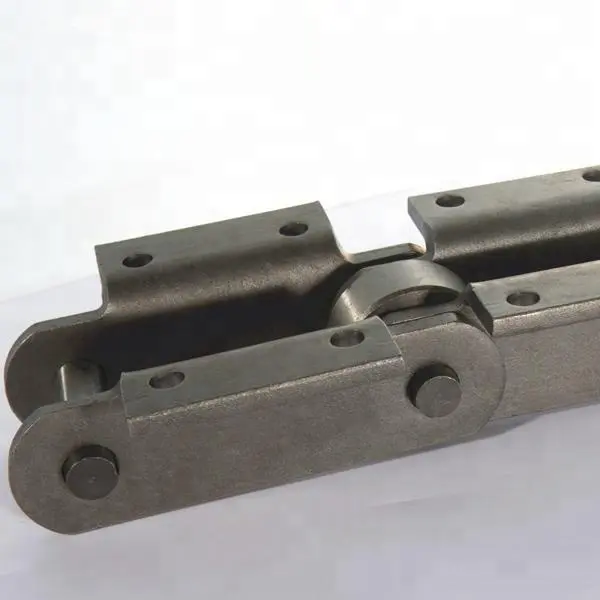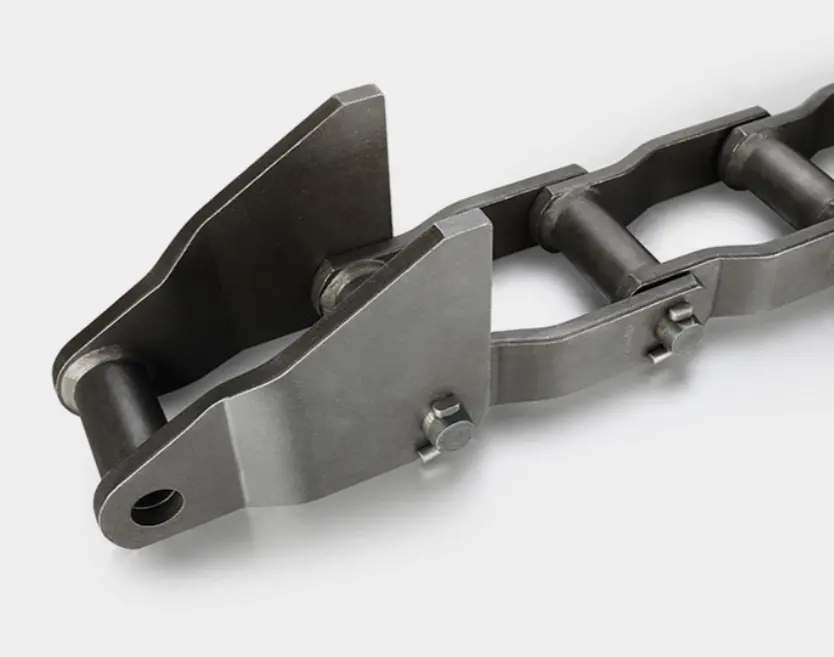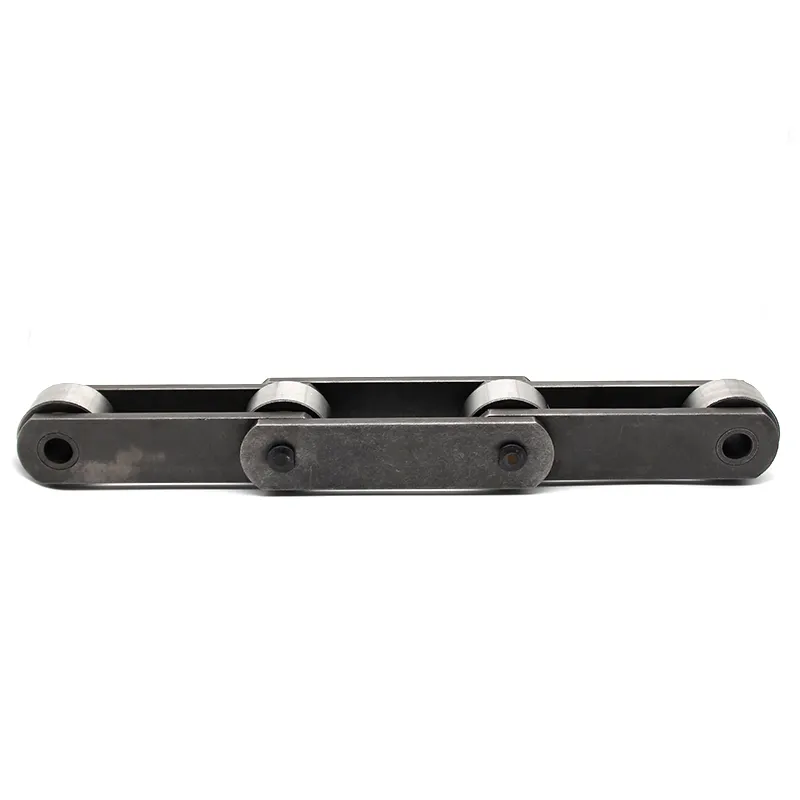Product Description
Conveyor chains for paper mill
conveyor chains with V-shaped top plates are used almost exclusively to handle paper rolls. The outboard rollers have a wider wheel gauge and provide more stability for the rolls.
conveyor chains are primarily used for handling paper rolls. Typically the conveyors are long and handling large or heavy loads requiring a heavy-duty chain as well.
Conveyor chains is widely used in Food,Forest Paper,Logistics Transportation,Packaging Machinery,Building Materials Machinery ,Environmental Protection and other other industries.
Typical products:
short pitch roller chain, double pitch conveyor chain, free flow chain, wood conveyor chain, long pitch conveyor chain, meat production line conveyor chain, food packaging machinery chain, hollow pin chain and accessories.
The paper roll conveying chain is a special conveying chain for the paper processing industry, which can provide various top plates with surface protection treatment according to working conditions; The main products are the P63 series and the P63.5 series.
The product has high strength, stable operation, and low noise using high-quality materials and advanced processing technology.
| Conveyor chains for paper mill |
63PF4 |
| 63PF2
|
63PF5 |
Please contact us for details.
| Standard or Nonstandard: | Standard |
|---|---|
| Application: | Conveyer Equipment |
| Surface Treatment: | Polishing |
| Structure: | Roller Chain |
| Material: | Alloy |
| Type: | Double Pitch Chain |
| Samples: |
US$ 100/Meter
1 Meter(Min.Order) | |
|---|
| Customization: |
Available
| Customized Request |
|---|

Can mill chains be used in material handling and conveyor systems in factories?
Yes, mill chains can be used in material handling and conveyor systems in factories. Mill chains are versatile and robust, making them well-suited for various industrial applications, including material handling and conveying. Here’s why mill chains are suitable for such systems:
Durability: Mill chains are designed to withstand heavy loads and continuous operation, making them ideal for material handling tasks in factories. They are made from high-quality materials, such as carbon steel or stainless steel, which provide excellent strength and durability.
High-Capacity: Mill chains have high load-carrying capacities, allowing them to handle large quantities of materials. This makes them suitable for use in conveyor systems where substantial material transfer is required, such as in assembly lines or bulk material handling processes.
Customization: Mill chains can be customized to fit specific conveyor system requirements in factories. They are available in various sizes and configurations, allowing for tailored solutions to match the application’s needs.
Smooth Operation: Mill chains offer smooth and reliable operation in material handling and conveying applications. Their design and construction contribute to reduced friction and wear, resulting in less downtime and lower maintenance costs.
Compatibility: Mill chains are compatible with standard sprockets, which simplifies the integration process into existing conveyor systems in factories. This compatibility also makes it easier to replace worn or damaged chains when necessary.
Cost-Effective: Considering their durability and long service life, mill chains offer a cost-effective solution for material handling and conveying in factories. They require less frequent replacement and maintenance, leading to reduced overall operational costs.
Overall, mill chains are a reliable and efficient choice for material handling and conveyor systems in factories, contributing to smooth and productive processes in industrial environments.

How do mill chains handle the transfer of materials in different physical forms?
Mill chains are designed to handle the transfer of materials in various physical forms, including bulk solids, powders, granules, and even liquids, depending on the specific application. Their robust construction and flexible design make them suitable for accommodating different material properties and forms. Here’s how mill chains handle the transfer of materials in various physical forms:
- Bulk Solids: For handling bulk solids, mill chains are equipped with attachments or flights that create a continuous conveying surface. The material is moved along the chain through the frictional force between the material and the chain’s conveying surface.
- Powders and Granules: When dealing with powdery or granular materials, mill chains may have special attachments, buckets, or pans to prevent material spillage during transfer. The chain’s design ensures that the powdery or granular materials remain contained and do not disperse during conveying.
- Liquids: Mill chains can also handle liquid materials, typically by incorporating troughs or channels in their design. The liquid material is contained within these troughs and transported along the chain to its destination.
- Viscous Materials: In the case of highly viscous materials, mill chains with scraper attachments may be used to prevent material buildup and ensure smooth transfer.
- Heat-Sensitive Materials: Some mill chains are designed to handle heat-sensitive materials by using heat-resistant materials or incorporating cooling mechanisms to prevent material degradation.
Proper chain selection is crucial to match the material’s characteristics and transfer requirements. The chain’s pitch, width, and material of construction are factors that affect its handling capability. Additionally, regular maintenance and inspection of the mill chains are essential to ensure their efficiency and reliability in handling materials of different physical forms.

What is a mill chain and how is it used in industrial applications?
Mill chains, also known as conveyor chains or industrial chains, are a type of heavy-duty chain used in various industrial applications. They are designed to convey or move materials in a controlled and efficient manner within industrial processes.
These chains typically consist of a series of interconnected links that form a continuous chain loop. Each link is designed to engage with sprockets, which provide the driving force to move the chain and the attached materials.
Mill chains are commonly used in industries such as:
- Steel Production: In steel mills, mill chains are used to transport raw materials, such as iron ore, coal, and limestone, to various processing stations.
- Lumber and Paper Industries: Mill chains are utilized to convey logs, wood chips, and paper rolls in sawmills and paper mills.
- Cement Plants: These chains are used to transport materials like limestone, gypsum, and clinker in cement manufacturing.
- Grain Handling: In grain elevators and agricultural facilities, mill chains are used to move bulk grains and seeds.
- Mining: Mill chains are used in mining operations to transport minerals and ores.
- Automotive Manufacturing: These chains are used in assembly line processes for automotive production.
- Bottling and Packaging: Mill chains are used to move products through bottling and packaging lines.
One of the essential features of mill chains is their robust construction, which allows them to handle heavy loads and endure harsh environments. They are often made from durable materials, such as carbon steel or stainless steel, to resist wear, corrosion, and other forms of damage.
Mill chains play a vital role in streamlining industrial processes, increasing productivity, and ensuring the efficient movement of materials throughout various stages of production. Proper maintenance and lubrication are necessary to extend the life and performance of mill chains in demanding industrial applications.


editor by CX 2023-10-23